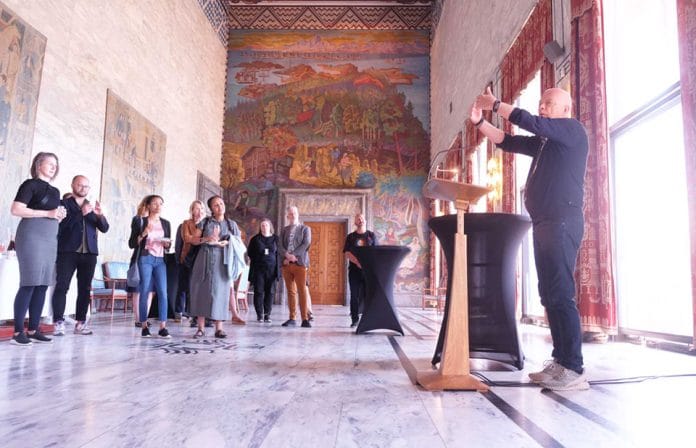Oslo has become the second Nordic city to join the Fast-Track Cities initiative by signing the Paris Declaration on cities ending the AIDS epidemic.
Oslo is joining a network of over 400 cities and municipalities around the world who are working to drive forward locally the global goal of ending AIDS as a public health threat by 2030.
Over half of all people living with HIV in Norway live in Oslo, and it is also the city where most new infections in Norway are being diagnosed.
Holistic approach needed
Robert Steen, Vice Mayor for Health, Ageing and Municipal Services in The City of Oslo, remarked:

“By signing this agreement, the City of Oslo acknowledges that to end the epidemic we need a holistic approach that provides everyone access to HIV prevention and life-saving and life-improving treatment, care and support services for HIV. It is not enough only to treat people for HIV if they still have poor health and quality of life. I am proud to say that the City of Oslo stands with cities around the world in the fight to eradicate this disease.”
The civil society organisation of people living with and affected by HIV in Norway, HIVNorge, advocated with the City Council in Oslo to become a part of the Fast-Track Cities initiative for more than three years, and are excited about the new partnership.
Addressing the event in the Oslo City Council, the Secretary General of HIVNorge Anne-Karin Kolstad said that “Stigma and self-stigma is a major problem for those among us who live with HIV in Oslo. It reduces the quality of life and makes people less able to protect themselves and others. We need new instruments to eliminate stigma for people who live with HIV.”
Multi-stakeholder strategy
HIVNorge will encourage the city to assess and prepare a status report on the HIV epidemic and response in Oslo, which can form the basis for the city’s multi-stakeholder strategy to achieve the goals and objectives of the Fast-Track Cities initiative. To adequately prioritise the HIV response, the city will first assess access and barriers to service uptake and provision, as well as measures supporting the HIV response under the auspices of both municipal and state actors together with non-governmental organisations.

The Fast-Track Cities initiative was launched in 2014 with support from four core partners: UNAIDS, the International Association of Providers of AIDS Care (IAPAC), UN-Habitat and the city of Paris. Signatories to the initiative commit to ending AIDS at the municipal level, through an accelerated HIV response, by providing leadership, putting people at the centre, addressing the causes of risk and vulnerability to HIV, using the AIDS response for positive social transformation, and mobilizing resources for integrated public health and sustainable development.
As a core technical partner to the Fast-Track Cities initiative, IAPAC is supporting member cities and municipalities in their efforts to optimize equity-based, data-informed HIV responses. Having worked with local stakeholders to facilitate Oslo becoming a Fast-Track City, Tanja Dittfeld, IAPAC’s Regional Director for Europe will work with HIVNorge to develop and implement a strategy aimed at closing gaps in HIV testing, prevention, and treatment, as well as addressing HIV and intersectional stigma and discrimination.
Second Nordic city
“We warmly welcome Oslo as the second Nordic city to join the global network of Fast-Track Cities committed to ending their urban HIV epidemics by 2030,” said Dr. José M. Zuniga, President/CEO of IAPAC and the Fast-Track Cities Institute. “We look forward to working with Oslo’s political, public health, and community stakeholders to advance an equitable and inclusive HIV response that leaves no person behind as the city aims to attain Fast-Track Cities objectives and targets.”
Cooperation and exchanges of experience with other European cities, including increasing support to cities in Eastern Europe, is critical at this point. In addition to a lack of resources, stigma and discrimination are major barriers to preventing new HIV infections and ensuring people living with HIV can access treatment and quality care.
UNAIDS Executive Director Winnie Byanyima said
“We are at a critical time in the HIV response where we need determined leadership from communities, CSOs, governments and the UN, together. The role of cities is key. With the brilliant facilitation by IAPAC, more and more cities are becoming Fast Track Cities. I congratulate Oslo and look forward to its engagement in the Fast-Track Cities initiative. Well done HIVNorge for this success in Oslo joining. Communities are the drivers of bold action to end inequalities.”




